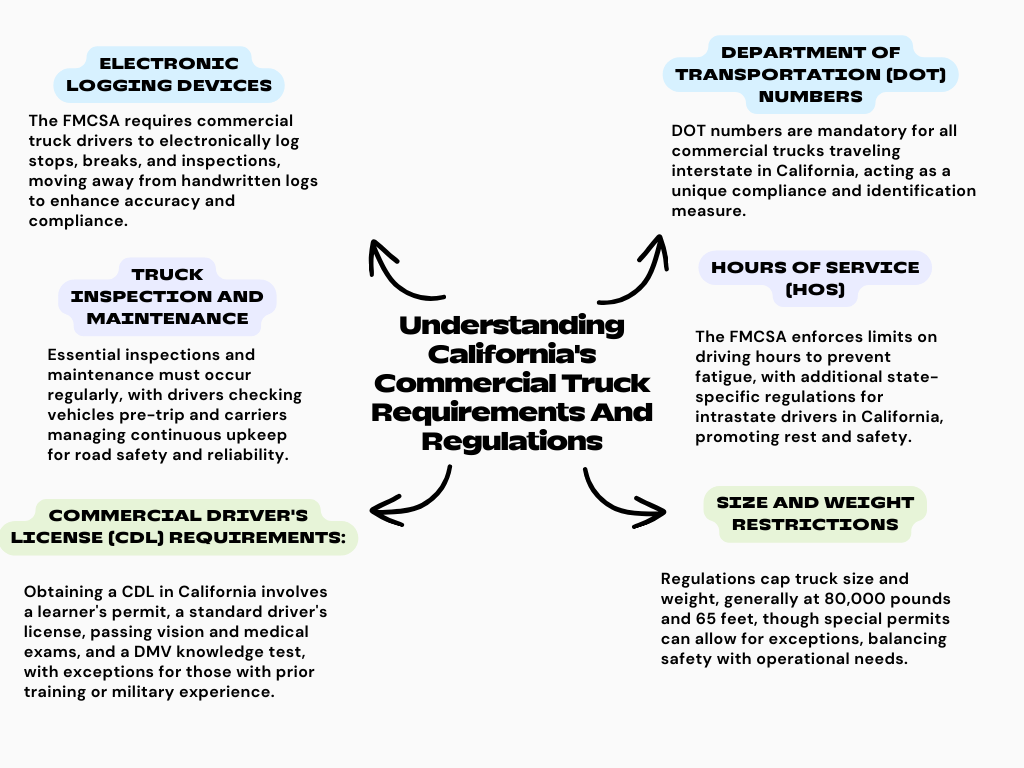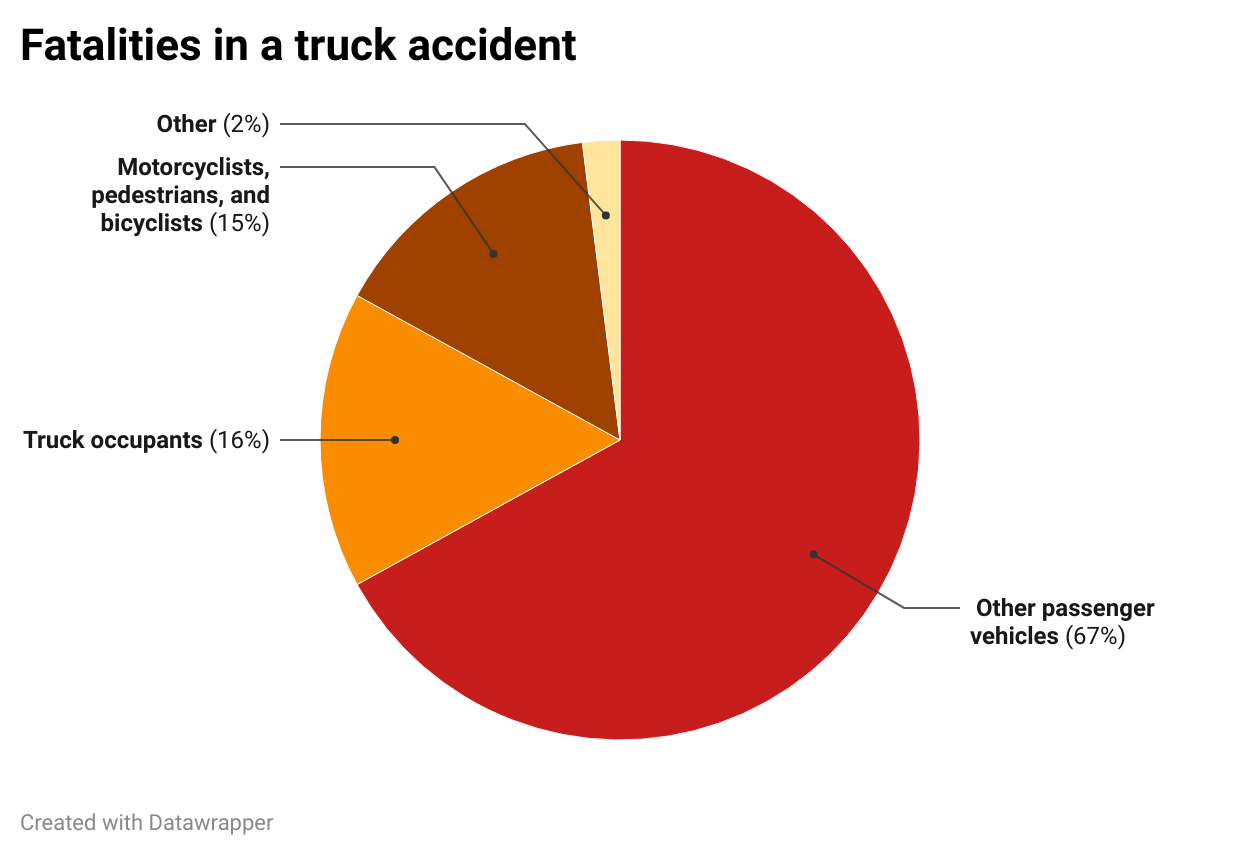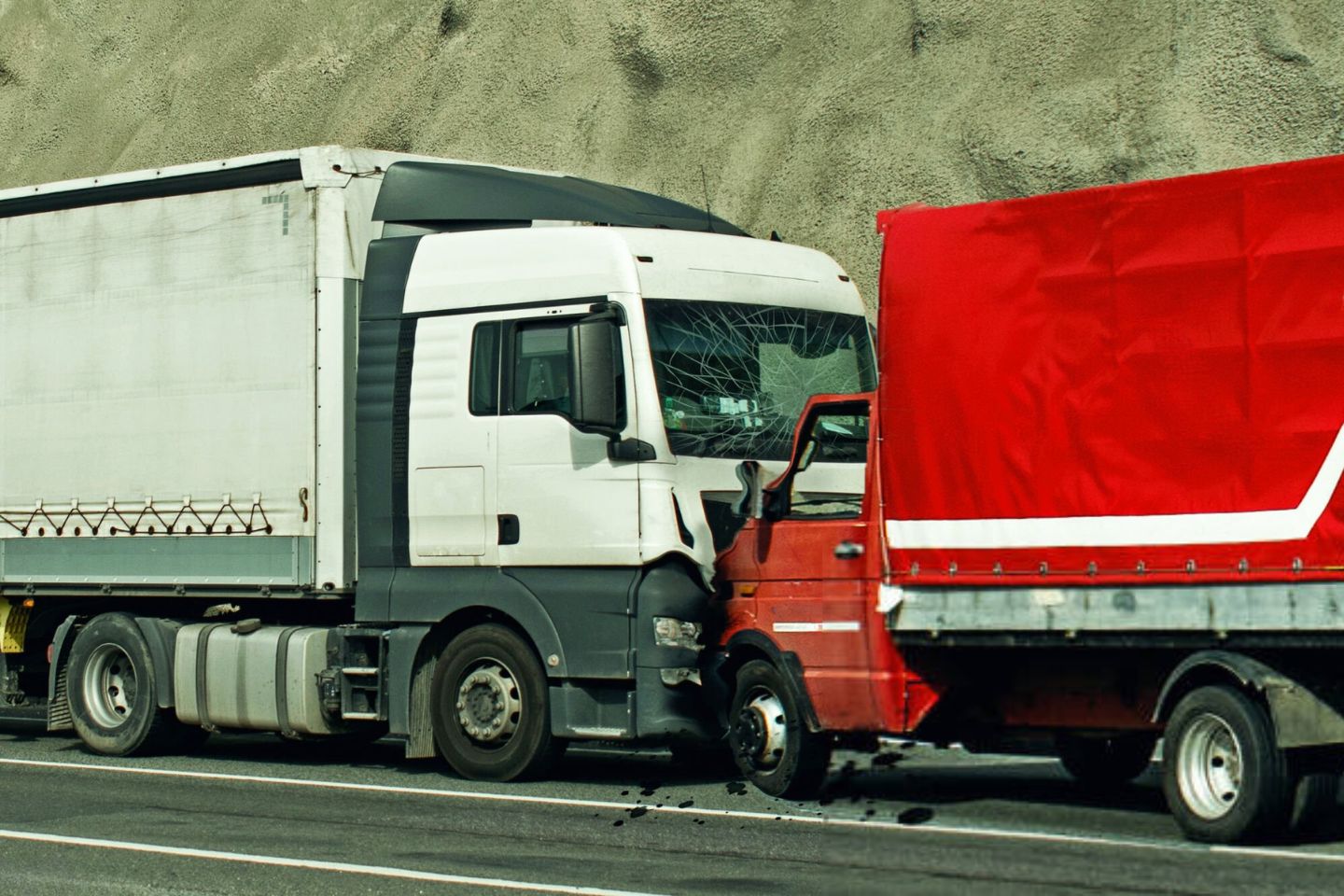In 2021, the United States witnessed an alarming number of 523,796 accidents involving large trucks. California, in particular, stands out as a hotspot for such incidents. The state’s status as a home to many of the country’s largest cities means truck drivers are frequently navigating its busy roads. This high level of activity highlights the critical need for strict safety regulations and guidelines for truck operations in California.
This article aims to shed light on California’s commercial truck requirements. It’ll explore the various regulations in place to enhance road safety and offer advice on the steps to take if you find yourself in a commercial truck accident within the state. By understanding these measures, we can contribute to making our roads safer.
- California's Commercial Truck Requirements And Regulations
- What Are California’s Commercial Truck Requirements for Insurance?
- Commercial Truck Accidents in California: Common Causes
- Safety Tips for Sharing the Road with Large Commercial Trucks In California
- Key Coverages of Insurance Policy for Commercial Trucks In California
- Safety Steps to Take after a Commercial Truck Accident in California
California’s Commercial Truck Requirements And Regulations


Navigating the requirements of commercial trucking in California involves understanding both federal and state regulations. Here’s a straightforward breakdown to help you grasp the essentials of what’s required for commercial trucking in the state.
Keeping a Driver’s Log
The Federal Motor Carrier Safety Administration (FMCSA) mandates that all commercial truck drivers log their stops, breaks, and inspection results. The need for handwritten logs has been eliminated, as electronic logging devices have become the norm.
Truck Inspection and Maintenance
Regular inspections and maintenance are non-negotiable. Drivers must check their vehicles before each trip, and trucking carriers are tasked with ongoing vehicle upkeep, ensuring safety and reliability on the road.
Commercial Driver’s License (CDL) Requirements
To drive a commercial truck in California, you must have a Commercial Driver’s License (CDL). The journey starts with acquiring a commercial learner’s permit for at least 14 days, alongside having a valid standard California driver’s license. Prospective CDL holders must pass a vision test, a medical exam, and a written knowledge test at the DMV. Those with prior CDL training or military experience may skip some tests.
Department of Transportation (DOT) Numbers
For interstate travel, every commercial truck in California must have a DOT number displayed on both sides, serving as a unique identifier and ensuring compliance with transportation regulations.
Hours of Service (HOS)
To combat fatigue, the FMCSA sets strict limits on driving hours per day and week. California adds its own layer of regulation for drivers operating solely within the state, ensuring everyone gets the rest they need to drive safely.
Size and Weight Restrictions
Trucks face limits on how heavy and large they can be, with standards typically capping weight at 80,000 pounds and length at 65 feet. Special permits can extend these limits, ensuring that trucks meet safety and infrastructure compatibility standards.
What Are California’s Commercial Truck Requirements for Insurance?


Navigating the insurance requirements for commercial trucks in California can be complex. By adhering to some specific insurance requirements based on the cargo type and operational scope, commercial truck owners in California can navigate the roads legally and safely. Here’s a simplified guide to help truck owners ensure they’re fully compliant:
Insurance Based on Cargo Type
- Household Goods: Trucks transporting household items must carry a minimum of $300,000 in insurance.
- General Freight: For general cargo, the minimum insurance required jumps to $750,000.
- Oil Transport: If a truck is moving oil, it needs at least $1,000,000 in coverage.
- Hazardous Materials: The highest insurance requirement is for hazardous materials, demanding a hefty $5,000,000 in coverage.
Cargo Insurance Requirements
Every commercial truck must have cargo insurance of $20,000 per vehicle and another $20,000 to cover potential catastrophes.
Proof of Insurance for Permit
To obtain a motor carrier permit in California, truck owners must first file proof of their insurance coverage, aligning with the types of goods they transport.
Cross-State Requirements
Trucks crossing state lines aren’t just subject to California’s laws; they must also comply with federal commercial truck insurance standards.
If you’re navigating the complexities of legal issues after sustaining injuries in a commercial truck accident, The Personal Injury Center is at your service. We’ll match you with experienced professionals who will lead you step by step through the legal journey, ensuring you receive the compensation you rightfully deserve.
Commercial Truck Accidents in California: Common Causes
Truck accidents in California are a major concern, frequently resulting in severe injuries and significant property damage. These accidents are complicated, involving numerous factors. For those impacted, knowing the causes is crucial for dealing with legal matters and the recovery journey.
Here are common causes of commercial truck accidents in California:
Fatigued Driving
Despite regulations set by the Federal Motor Carrier Safety Administration (FMCSA) to limit hours of service and combat fatigue among truck drivers, some ignore these rules, leading to accidents. Fatigue impairs a driver’s reaction time and judgment, making fatigued driving a significant risk on California roads.
Negligent Hiring Practices
Some trucking companies prioritize cost-saving over safety by hiring unqualified drivers, including those who fail to meet California’s commercial truck requirements. Whether due to medical conditions, a history of safety violations, or a lack of qualifications, these decisions can lead to severe accidents. Companies might also negligently retain drivers known to be unsafe, potentially bearing liability for any resulting harm.
Speeding and Reckless Driving
Even with a commercial driver’s license (CDL) and training, some truck drivers engage in risky behaviors like speeding or driving under the influence of alcohol or drugs. These actions reduce their ability to react to road conditions and other vehicles, increasing the likelihood of accidents.
Distracted Driving
Like all drivers, truckers can be distracted, particularly by mobile phones. Strict federal regulations limit mobile phone use by truck drivers to prevent distracted driving accidents. Despite these rules, distracted driving remains a concern for the safety of all road users.
Poor Maintenance
Trucks require regular maintenance to ensure all parts are in good working order. Failure to maintain brakes, tires, power steering, and other critical components can lead to accidents. California’s commercial truck requirements mandate regular vehicle inspections and maintenance, but adherence varies, underscoring the need for proactive and preventative care.
If you find yourself in a commercial truck accident, contact The Personal Injury Center right away. We will put you in touch with skilled lawyers in your area who will navigate you through the legal maze and ensure you receive the compensation you deserve.
Safety Tips for Sharing the Road with Large Commercial Trucks In California


Driving safely around large commercial vehicles is crucial for every road user’s safety. The Insurance Institute for Highway Safety (IIHS) reports that the majority of fatalities in large truck crashes involve occupants of passenger vehicles. This highlights the need for drivers to be well-versed in safety practices when sharing the road with these trucks. By following key safety strategies, you not only protect yourself but also contribute to a safer environment on roads heavily trafficked by commercial trucks:
- Pass Quickly and Safely: Given their size and weight, commercial trucks may not keep a consistent speed, often requiring you to pass them. When overtaking, ensure it’s safe to do so, then proceed quickly. Minimize the time you’re side by side with a semi-truck to reduce risks. This tactic is vital for your safety and is in the spirit of careful driving practices recommended around large vehicles.
- Drive Defensively: This approach involves staying alert, paying close attention to your surroundings, considering road and weather conditions, and maintaining a safe distance from all vehicles, particularly trucks.
- Consistently Use Your Turn Signals: Driving demands full attention, and signaling your intentions plays a critical role in road safety. Always use your turn signals when changing lanes or turning, a practice that helps communicate with truck drivers and others on the road. Making this a non-negotiable habit enhances safety for everyone.
Key Coverages of Insurance Policy for Commercial Trucks In California
When navigating California’s commercial truck requirements, securing the right insurance package is crucial for comprehensive protection against the variety of risks in trucking operations. Let’s delve into the essential coverages that align with these requirements:
Trucker Auto Liability
This insurance is a must-have for all commercial trucks operating within the state. It offers protection against liabilities arising from accidents where you or your driver are at fault, covering medical expenses for injuries and damages to property. Additionally, it takes care of legal defense costs in the event of lawsuits.
Motor Truck Cargo Insurance
This specific coverage is designed to protect the goods and property being transported, adhering to California’s commercial truck requirements by reducing the risk of loss or damage during transit.
Required Coverage Amounts
Reflecting the serious responsibility truckers bear on the road, the Department of Transportation insists on insurance coverage ranging from $750,000 to $1,000,000. This requirement is based on the truck’s size, its operational range, and the nature of the cargo transported, ensuring that every aspect of commercial trucking in California is adequately covered.
General Liability Insurance
Beyond the direct operations of trucking, general liability insurance is crucial for protecting your business from indirect risks, such as incidents at your premises that could lead to injuries.
Physical Damage Coverage
Essential for the welfare of the commercial vehicle itself, this insurance covers repairs needed due to collision, vandalism, or fire, safeguarding your investment in your trucking equipment.
Workers’ Compensation
Aligning with the care for employees mandated by California law, this coverage supports your workforce in case of job-related injuries or diseases, providing essential benefits and supporting overall workplace safety.
Safety Steps to Take after a Commercial Truck Accident in California


Knowing what to do after a commercial truck accident plays a significant role in your safety. This guide outlines crucial steps to take after a truck accident, offering practical advice to ensure safety, protect your rights, and navigate the complex process of seeking compensation with the help of experienced legal representation:
- Move to Safety and Call 911: Immediately, if you can, move to a safe area away from traffic. Then, dial 911. This ensures your safety and starts the official accident report.
- Exchange Insurance Information: Collect the insurance details from the truck driver and any other involved parties. This is essential for your compensation claims.
- Report the Accident to the Police: Inform the police about the incident. This creates a legal record that could be crucial later on.
- Limit Discussions About the Accident: Avoid talking about the accident details with anyone, especially insurance adjusters. They might use your words against you. Leave communications to a seasoned truck accident lawyer.
- Document Everything at the Scene: Take photos or videos of the scene, including all damages and injuries. Record every detail—no matter how small—including keeping tabs on all expenses related to the accident like bills, repair costs, and medical expenses.
- Understand the Full Scope of Your Damages: Recognize that your compensation should cover both economic and non-economic damages. This includes medical bills, loss of earnings, pain, and suffering, among others.
- Identify All Potential Liable Parties: Truck accidents often have multiple liable parties—from the driver to the company or even the manufacturer of faulty parts. A thorough investigation is crucial to pinpoint all responsible parties.
- Seek Legal Representation: Find an experienced lawyer who knows how to negotiate with big companies and navigate through the legal details, aiming to secure the best possible outcome for your recovery.
- Prepare for a Tough Legal Battle: Be aware that trucking and insurance companies have extensive legal resources. They will try to minimize their payout.
Recovering from a truck accident can be a difficult process. If you’ve been injured in a commercial truck accident, reach out to The Personal Injury Center. We’ll connect you with experienced lawyers near you. Our main goal is to ensure you get the compensation you deserve for your injuries.
Key Takeaways
|



